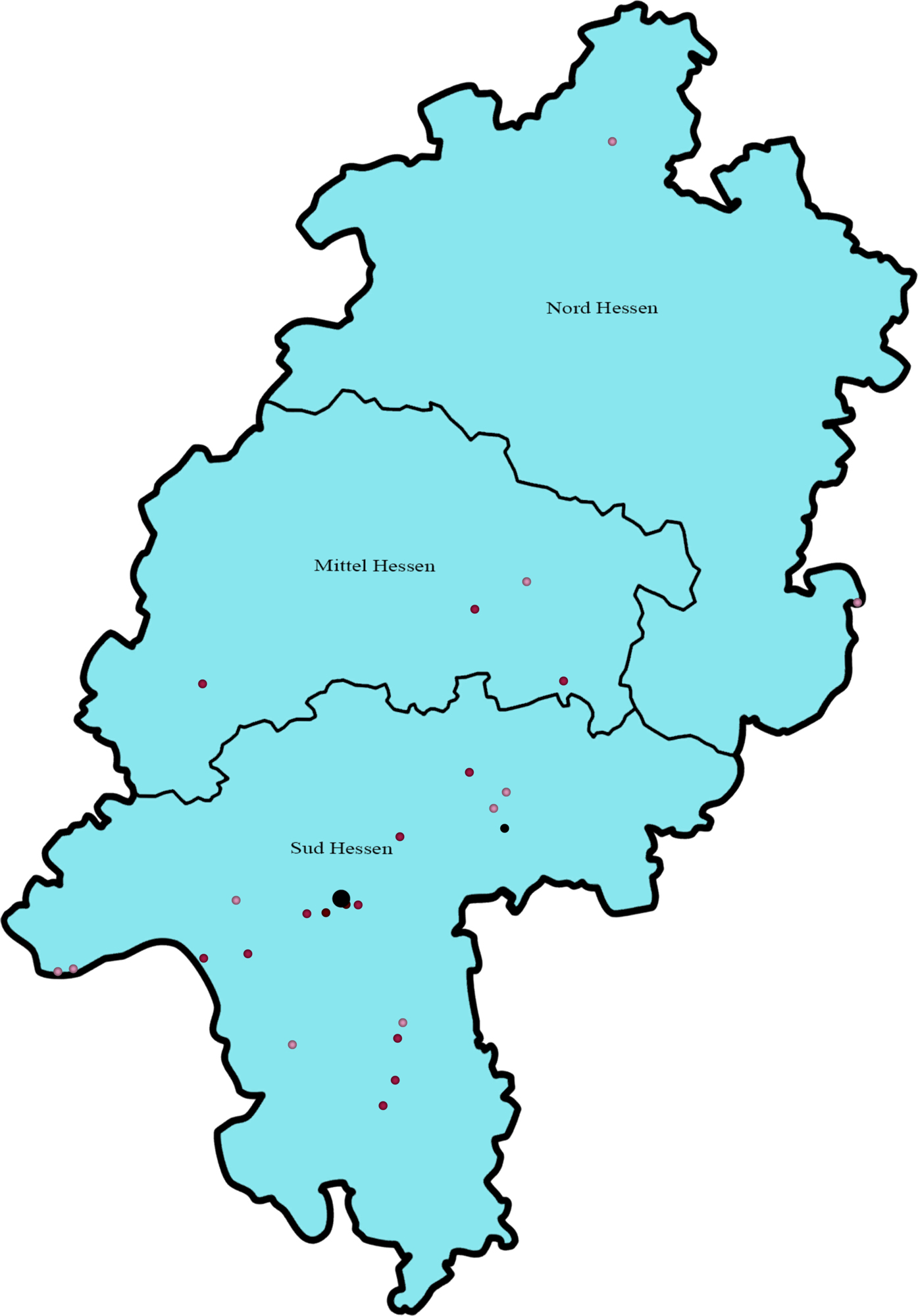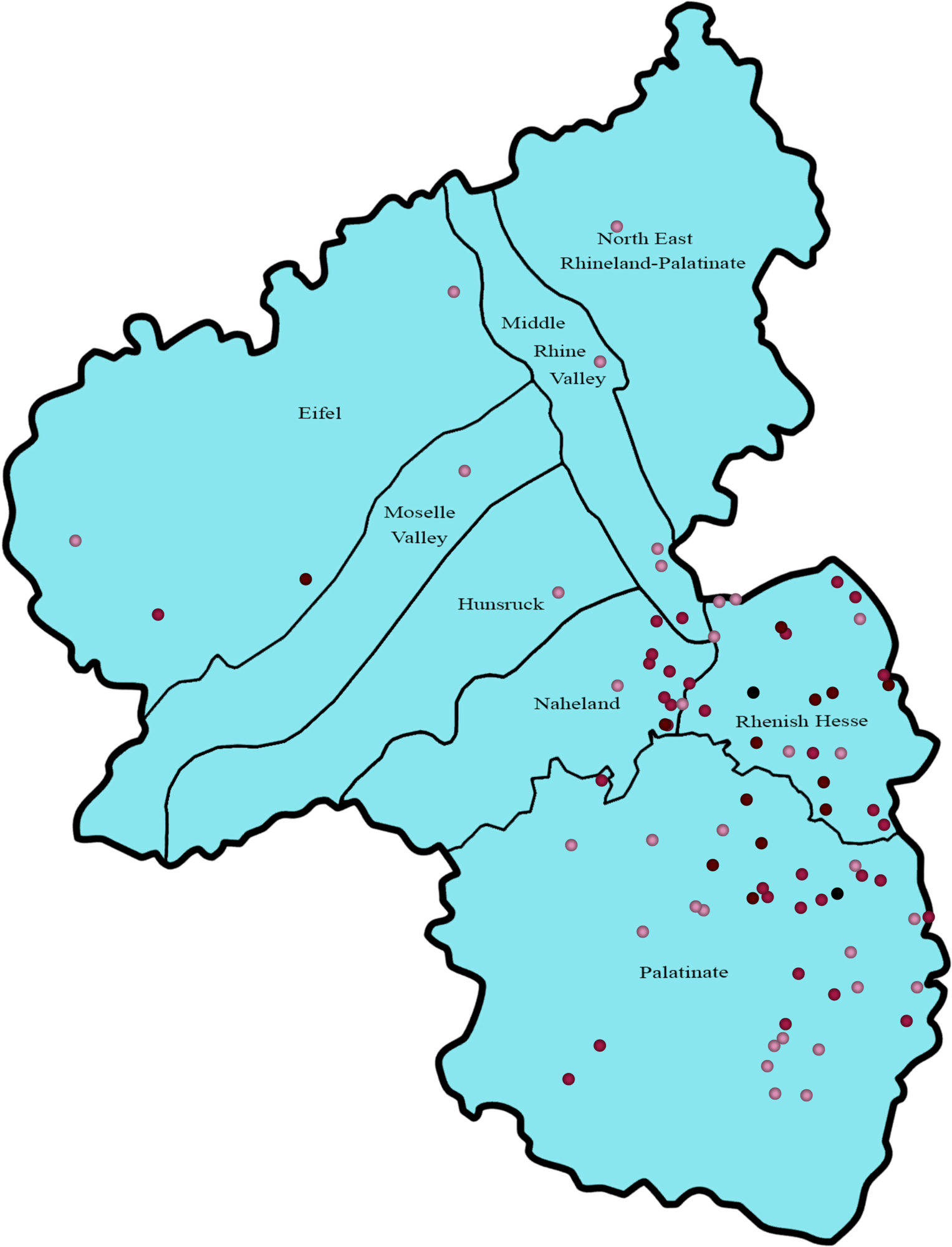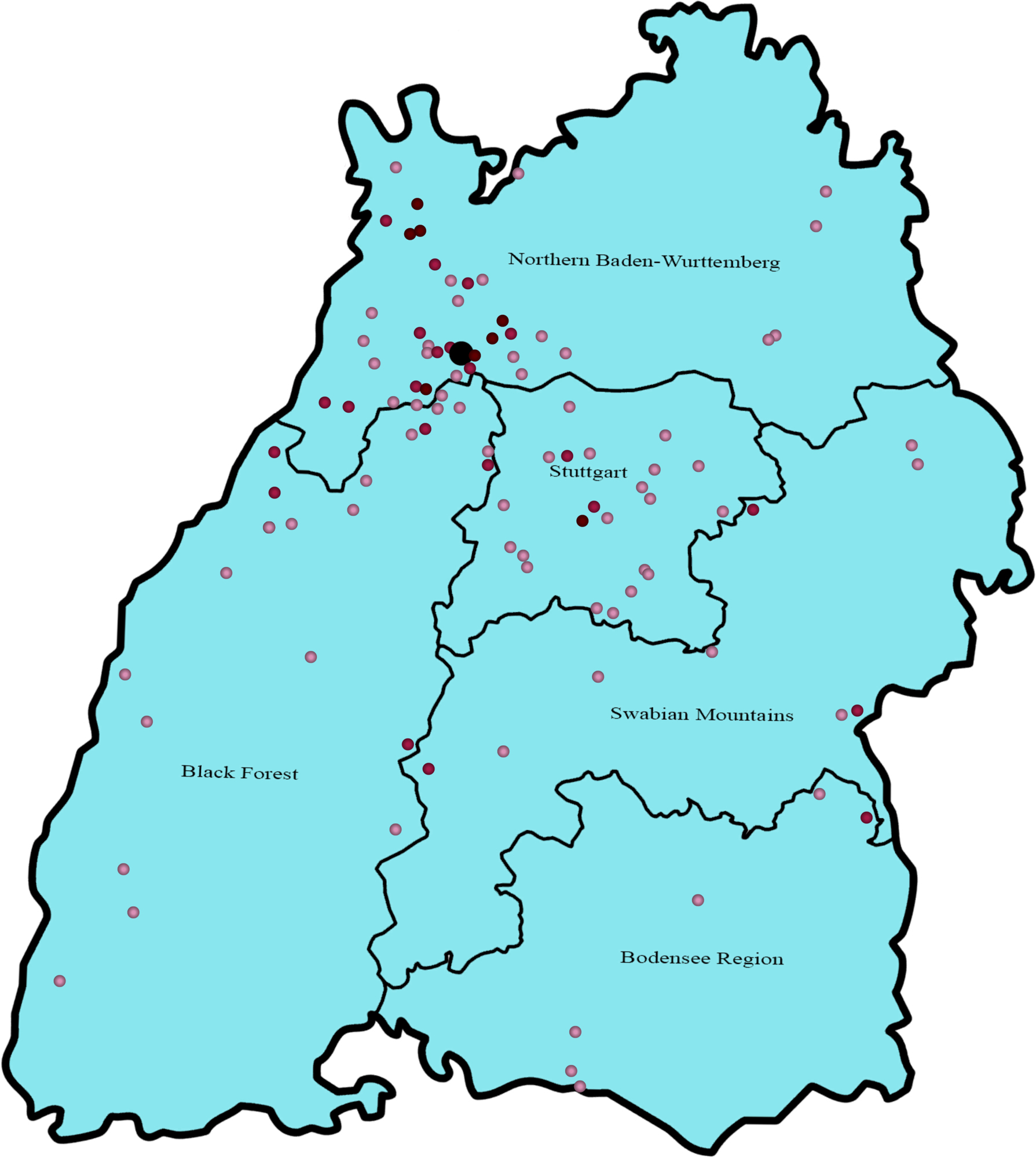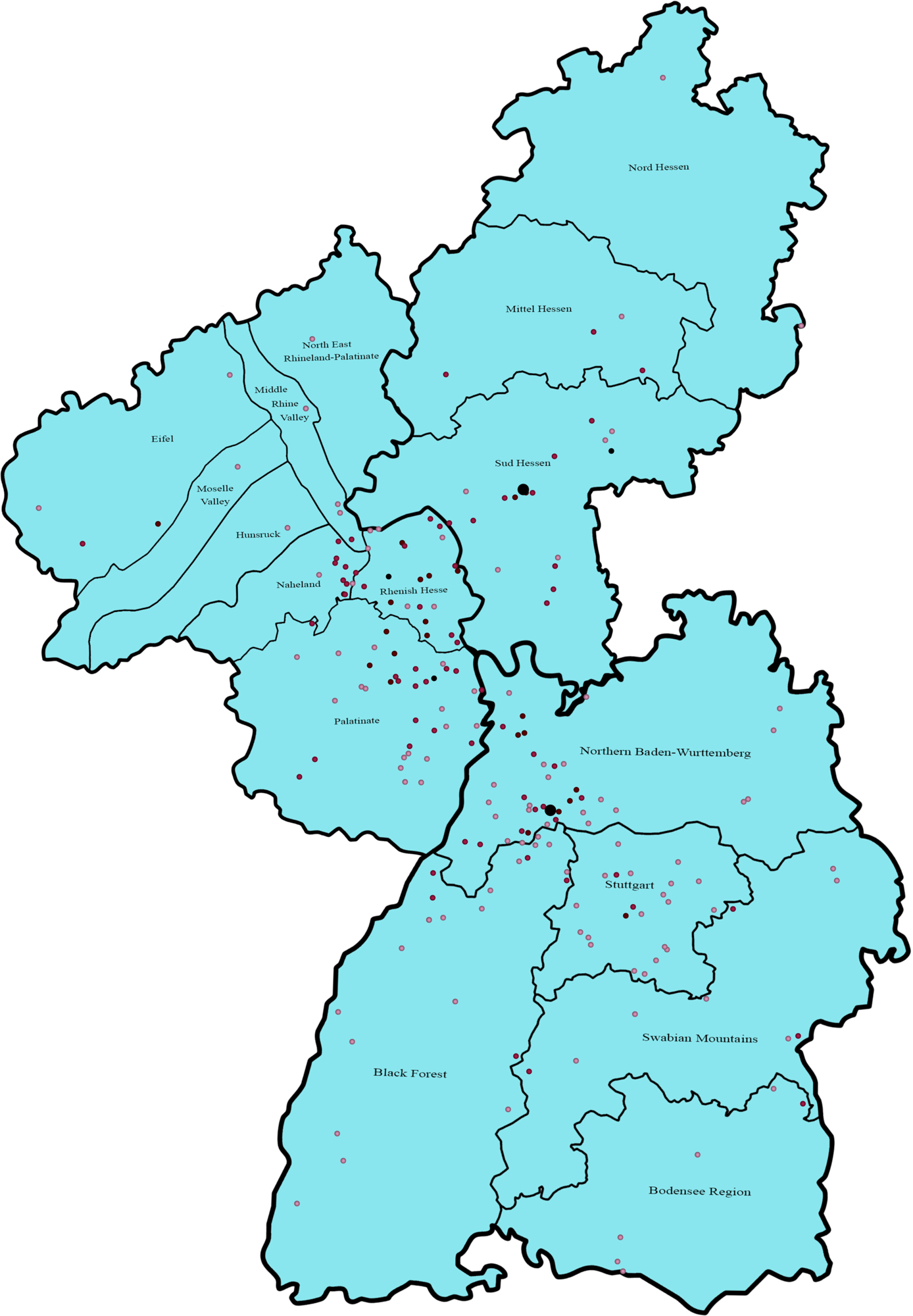Origins Of The Dauth Surname
Scouring the various genealogical websites reveals a treasure trove of records detailing the life events of Dauths throughout history. On their own, these records are just a moment of an individual’s life, summarized as a date, location, and event. But when put into a context of other similar records, an interesting story starts to unfold.
Using a combination of birth, death, marriage, and resident records available on FamilySearch.com, Ancestry.com, and MyHeritage.com its possible to make “heat maps” of the Dauth name. A heat map in this context is simply how often the name “Dauth” appears in written text. The darker the color the more prevalent. Below are worldwide heat maps of the Dauth name from 1500-1600 AD and 1600-1700 AD.

dauth-worldwide-1500s
Instances of the Dauth surname worldwide from 1500-1600 AD.

dauth-worldwide-1600s
Instances of the Dauth surname worldwide from 1600-1700 AD.
The earliest instances of the Dauth surname occurs in 1578 in Frankfurt, Germany and then in 1579 in Iptingen, Germany.1“Deutschland, ausgewählte evangelische Kirchenbücher 1500-1971,” database, FamilySearch (https://familysearch.org/ark:/61903/1:1:QPF4-P3S6 : 26 October 2021), Dauth, 19 Apr 1578; images digitized and records extracted by Ancestry; citing Burial, Frankfurt am Main, Hessen-Nassau, Preußen, Deutschland, Frankfurt, German Lutheran Collection, various parishes, Germany.2“Deutschland, ausgewählte evangelische Kirchenbücher 1500-1971,” database, FamilySearch (https://familysearch.org/ark:/61903/1:1:QPGZ-7TDL : 25 October 2021), Anna Dauth, 13 Sep 1579; images digitized and records extracted by Ancestry; citing Baptism, Iptingen, Iptingen, Vaihingen, Württemberg, Deutschland, Iptingen, German Lutheran Collection, various parishes, Germany. The earliest instance outside of Germany occurs in 1588 in Toulouse, France.3“France, Haute-Garonne, Toulouse, registres paroissiaux, 1539-1793,” database with images, FamilySearch (https://familysearch.org/ark:/61903/1:1:QPJX-PY1F : 8 March 2021), Jean Vidal and Jeanne Dauth, 26 Nov 1588; citing Marriage, Daurade, Toulouse, Haute-Garonne, France, Archives municipales de Toulouse (Municipal Archives of Toulouse), France. When looking at the 1500s as a whole, it appears that the Dauth name is just slightly more popular in Germany than in France. Its not until the 1600s that it becomes obvious that Dauth is a much more popular name in Germany. This supports the hypothesis that Dauth is German in origin based on its etymology.
Keeping this Germanic origin in mind, the following heat maps show a detailed breakdown of Germany by its states and cities. States are shown in shades of blue and cities are shown in shades of red. Hovering over the maps with your cursor will show how many “instances” of Dauth appear in that area over the given time period.

dauth-germany-1500s

dauth-germany-cities-1500s
Instances of the Dauth surname from 1500-1600 AD. Total instances: 10.
![]() 1 instance |
1 instance | ![]() 2-5 instances
2-5 instances

dauth-germany-1600s

dauth-germany-cities-1600s
Instances of the Dauth surname from 1600-1700 AD. Total instances: 112.
![]() 1 instance |
1 instance | ![]() 2-9 instances |
2-9 instances | ![]() 10-49 instances
10-49 instances
The earliest records from the 1500s place the origins of the Dauth name within the modern days states of Hesse, Baden-Württemberg, and Rhineland-Palatinate. The cities of Frankfurt and Iptingen in turn yielded the earliest and highest concentration of records during this time period.
During the 1600s these three states continued to have a large number of Dauth instances compared to the rest of Germany. Rhineland-Palatinate had the largest concentration, with the towns of Gau-Bickelheim and Weisenheim am Sand accounting for over 80% of all instances within the state. Baden-Württemberg had the second highest concentration, but no towns stood out as hotspots for the Dauth name. In the state of Hesse, the city of Frankfort accounted for over 90% of all instances within Hesse.

dauth-germany-1700s

dauth-germany-cities-1700s
Instances of the Dauth surname from 1700-1800 AD. Total instances: 572.
![]() 1 instance |
1 instance | ![]() 2-9 instances |
2-9 instances | ![]() 10-49 instances |
10-49 instances | ![]() 50+ instances
50+ instances

dauth-germany-1800s

dauth-germany-cities-1800s
Instances of the Dauth surname from 1800-1900 AD. Total instances: 1003.
![]() 1 instance |
1 instance | ![]() 2-9 instances |
2-9 instances | ![]() 10-49 instances |
10-49 instances | ![]() 50+ instances
50+ instances
The 1700s saw continued growth in the same states. Hesse had the largest concentration, with Frankfurt accounting for over 80% of all instances within Hesse, and over 40% of all instances nationwide. Rhineland-Palatinate had the second largest concentration, with the towns of Gau-Bickelheim and Weisenheim am Sand continuing to be hotspots for the Dauth name. These cities accounted for about 50% of all instances within Rhineland-Palatinate. Baden-Wurttemberg trailed behind this century with no particular cities showing high instances.
As with the prior centuries, the states of Hesse, Rhineland-Palatinate, and Baden-Württemberg contain the majority of instances during the 1800s. Hesse contains about 40% of all instances, with the cities of Frankfurt and Mittelgrundau being epicenters. Baden-Württemberg accounts for about 30% of all instances, with the city of Zaisenhausen appearing as a new hotspot. Rhineland-Palatinate accounts for about 20% of instances nationwide.
From the 1500s to the 1900s the same three German states have consistently contained the highest concentrations of the Dauth name. Below are detailed maps of these three states overlayed with a city heatmap of all instances of the Dauth name from 1500-1900 AD.
Notes On Data Analysis
Records regarding births, death, marriages, residency, and baptisms were taken from FamilySearch.com, Ancestry.com, and MyHeritage.com. For records from 1700-1900 AD baptism data was omitted due to the data scraping technique unable to readily gather location information. Records without a city location and corresponding date were omitted from the analysis. Duplicate records, identified by name, year, and location were omitted. GPS coordinates were found using GPSvisualizer.com and presented with Google Earth.
State Of Hesse

dauth-germany-regions-1500-1900-hesse

dauth-germany-cities-1500-1900-hesse
Instances of the Dauth surname from 1500-1900 AD. The state of Hesse is highlighted in blue.
![]() 1 instance |
1 instance | ![]() 2-9 instances |
2-9 instances | ![]() 10-49 instances |
10-49 instances | ![]() 50+ instances
50+ instances

Regional map of Hesse, with instances of the Dauth surname from 1500-1900 AD.
![]() 1 instance |
1 instance | ![]() 2-9 instances |
2-9 instances | ![]() 10-49 instances |
10-49 instances | ![]() 50-99 instances |
50-99 instances | ![]() 100+ instances
100+ instances
The state Of Hesse has historically been home to Germany’s second most populous metropolitan area, located in Sud Hessen with Frankfurt at its center.4Wikipedia contributors. (2023b, January 25). Hesse. Wikipedia. https://en.wikipedia.org/wiki/Hesse As stated before, the earliest known record of a Dauth comes from Frankfurt in 1578. Since then, Frankfurt has continuously been home to the highest concentration of Dauths in Germany, and by extension, the world.
Another major hotspot in Hesse is the small town of Mittel Grundau east of Frankfurt. For a town with such a small population (pop. 2165 in 2021) an unusually high number of events featuring Dauths were recorded there.5Wikipedia contributors. (2022b, November 11). Gründau. Wikipedia. https://en.wikipedia.org/wiki/Gr%C3%BCndau
State Of Rhineland-Palatinate

dauth-germany-regions-1500-1900-rhine

dauth-germany-cities-1500-1900-rhine
Instances of the Dauth surname from 1500-1900 AD. The state of Rhineland-Palatinate is highlighted in blue.
![]() 1 instance |
1 instance | ![]() 2-9 instances |
2-9 instances | ![]() 10-49 instances |
10-49 instances | ![]() 50+ instances
50+ instances

Map of Rhineland-Palatinate, with instances of the Dauth surname from 1500-1900 AD.
![]() 1 instance |
1 instance | ![]() 2-9 instances |
2-9 instances | ![]() 10-49 instances |
10-49 instances | ![]() 50-99 instances
50-99 instances
Rhineland-Palatinate has historically been one of Germany’s most important agricultural regions.6Wikipedia contributors. (2023, January 22). Rhineland-Palatinate. Wikipedia. https://en.wikipedia.org/wiki/Rhineland-Palatinate The majority of Dauth instances are found in Rhenish-Hesse and Palatinate, which are part of the Upper Rhine Plain and the center of Germany’s largest wine region.7Wikipedia contributors. (2022a, October 31). Upper Rhine Plain. Wikipedia. https://en.wikipedia.org/wiki/Upper_Rhine_Plain Gau-Bickelheim (pop. 2170 in 2021) in Rhenish-Hesse and Weisenheim am Sand (pop. 4325 in 2021) in Palatinate, are two small towns that had unusually high Dauth activity from 1600-1800 AD.8Wikipedia contributors. (2021, August 3). Gau-Bickelheim. Wikipedia. https://en.wikipedia.org/wiki/Gau-Bickelheim9Wikipedia contributors. (2021b, August 3). Weisenheim am Sand. Wikipedia. https://en.wikipedia.org/wiki/Weisenheim_am_Sand Aside from these two hotspots, instances are dispersed fairly evenly throughout the regions’ vineyards and farmlands.
State Of Baden-Württemberg

dauth-germany-regions-1500-1900-baden

dauth-germany-cities-1500-1900-baden
Instances of the Dauth surname from 1500-1900 AD. The state of Baden-Württemberg is highlighted in blue.
![]() 1 instance |
1 instance | ![]() 2-9 instances |
2-9 instances | ![]() 10-49 instances |
10-49 instances | ![]() 50+ instances
50+ instances

Map of Baden-Wurttemberg, with instances of the Dauth surname from 1500-1900 AD.
![]() 1 instance |
1 instance | ![]() 2-9 instances |
2-9 instances | ![]() 10-49 instances |
10-49 instances | ![]() 100+ instances
100+ instances
The Dauths of Baden-Württemberg are primarily concentrated in Northern Baden-Württemberg and Stuttgart. Northern Baden-Württemberg, specifically its sub-region known as Kraichgua, has historically been a farming region and part of the Upper Rhine Plain.10Wikipedia contributors. (2022a, July 18). Kraichgau. Wikipedia. https://en.wikipedia.org/wiki/Kraichgau The town of Zaisenhausen (pop. 1833 in 2021) had an extremely high number of Dauth instances.11Wikipedia contributors. (2022b, October 10). Zaisenhausen. Wikipedia. https://en.wikipedia.org/wiki/Zaisenhausen Of the 121 recorded events there, 95 were marriages at the local Zaisenhausen church. Aside from Zaisenhausen, most instances are distributed evenly throughout the Kraichgua region.
Stuttgart is the capital of Baden-Württemberg and the economic center of the state. A fairly large number of instances occur outside the city center but within a 15 mile radius. This hilly region just outside the city is known historically for its agriculture and vineyards.12Wikipedia contributors. (2023b, January 24). Stuttgart. Wikipedia. https://en.wikipedia.org/wiki/Stuttgart
Summary

Combined map of Hesse, Rhineland-Palatinate, and Baden-Württemberg, showing how the Dauths are spread across the Upper Rhine Plain of Rhenish Hesse, Palatinate, Northern Baden-Württemberg, and Stuttgart.
![]() 1 instance |
1 instance | ![]() 2-9 instances |
2-9 instances | ![]() 10-49 instances |
10-49 instances | ![]() 50-99 instances |
50-99 instances | ![]() 100+ instances
100+ instances
From this rudimentary study we can make some general statements about the origins and movements of the first Dauths.
The first Dauths were German. The oldest records of the Dauth name date back to 1578 in Frankfurt, Germany. While the Dauth name did appear in France within a decade, by the end of the 1600s the surname Dauth was more than a thousand times more popular in Germany than anywhere else in the world.
The first Dauths originated from the German states of Hesse, Rhineland-Palatinate, and Baden-Wurttemberg. Both the oldest and majority of records with the Dauth name are found within these three states. While the number of records in each state fluctuated drastically between the centuries, they were consistently the three most popular states for the Dauth surname.
The Dauths favorite city was Frankfurt. From the 1500 AD to 1900 AD Frankfurt has continuously had the most instances of the Dauth name each century.
The Dauths were drawn to the Upper Rhine Plain. Outside of Frankfurt, the Dauths were found throughout the regions of Rhenish-Hesse, Palatinate, and Northern Baden-Wurttemberg, nutrient rich agricultural lands bordering the Rhine and known as the Upper Rhine Plain.
Every year more and more records are being found and transcribed. Adding these records and data omitted from this study, could yield entirely different results. These conclusions are not set in stone and its likely in the future more insights into the history of the Dauths will be found.

